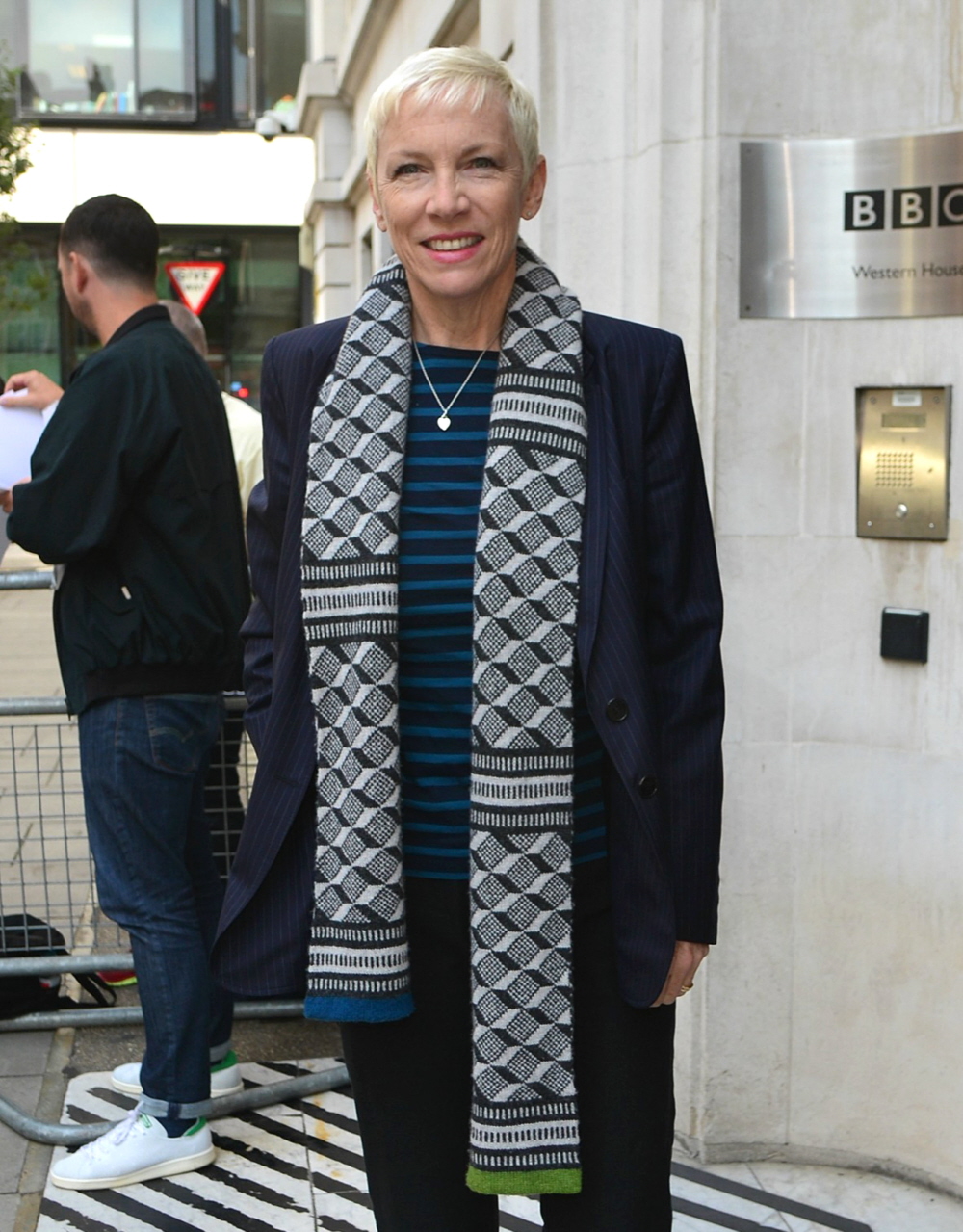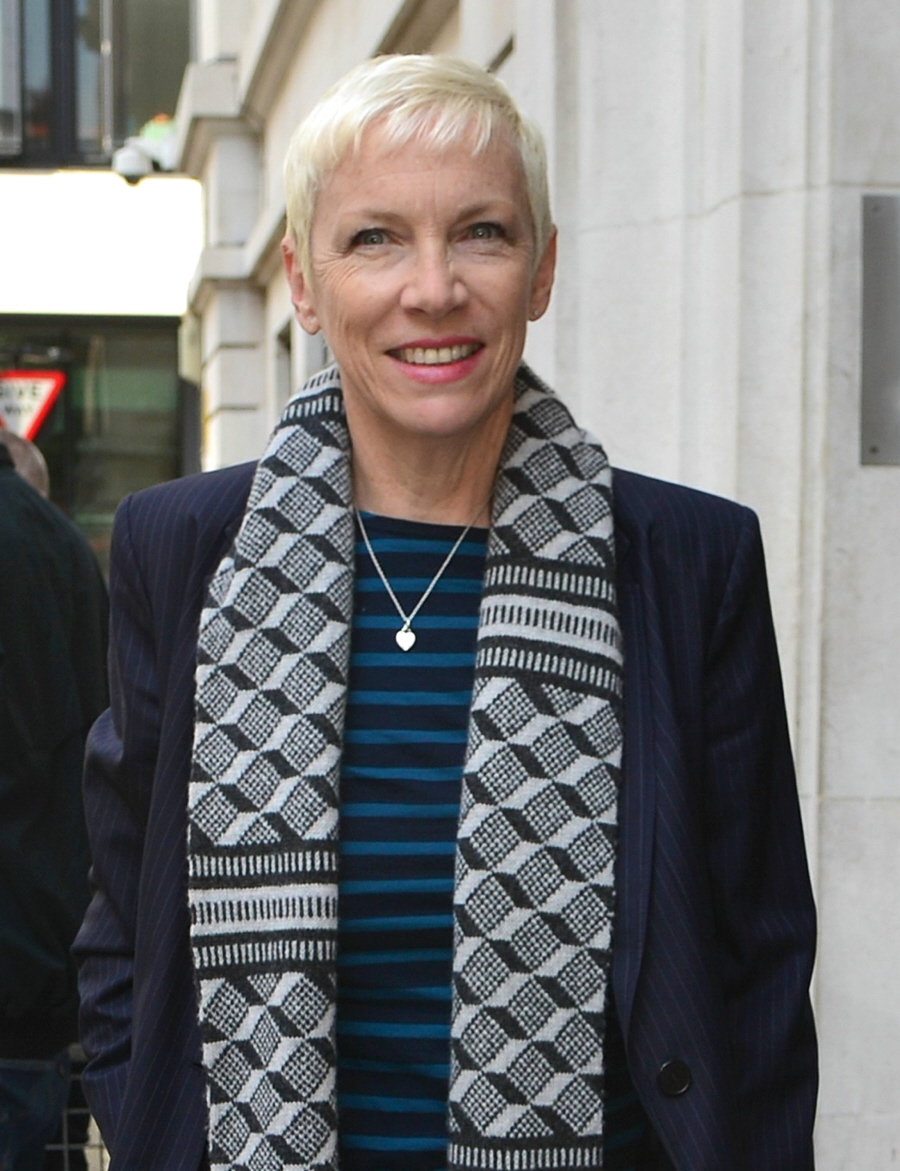Last fall, Annie Lennox was doing a lot of promotional work for her album of jazz standards, Nostalgia. She ended up answering a lot of questions about the state of feminism today, plus what she likes and does not like in the music industry. She got a lot of headlines for throwing shade at twerking-as-feminism, plus she called Beyonce “feminist lite.” Annie also stirred up a controversy when she discussed one of the song covers on her album, “Strange Fruit.” The most famous version of “Strange Fruit” is Billie Holiday’s version. It’s a song about witnessing a lynching in the American South, back when lynchings were a regular event (post-Civil War through the 1950s).
The lyrical imagery in “Strange Fruit” is striking and disturbing. But when Annie appeared on Tavis Smiley’s show last year, she refused to say the word “lynching.” Gawker accused her of “whitewashing” the subject matter of the song – go here to read Annie’s comments to Smiley, and Gawker’s take on Annie’s comments. At the time, I did think Gawker was being slightly unfair to Annie (she clearly knew the history of the song) AND I thought Annie could have explained herself and her reasoning better. Well, Annie gave a new interview this week, and she directly addresses the “Strange Fruit” whitewashing controversy and sort of slams Gawker.
Annie Lennox says online criticism leveled at her remarks about the anti-lynching song “Strange Fruit” was hurtful and unfair.
“It was so painful. I can’t even begin to tell you. I’m the last person who would disrespect that history,” Lennox said.
In a TV interview last fall about her new CD, “Nostalgia,” and the “Strange Fruit” track it includes, Lennox didn’t mention that the 1930s song made famous by Billie Holiday was a direct attack on African-American hangings of the era. Blogs and posts on Twitter accused her of “whitewashing” the song’s origins by referring generally to human violence and bigotry while speaking to PBS host Tavis Smiley last October.
Lennox, appearing Monday night at a Television Critics Association meeting to promote a spring PBS “Nostalgia” concert special, was asked about the controversy. She said she was glad to address it after initially remaining silent. Because of one blog and what she called its “opportunistic swipe,” the “whole thing blew out of context,” said the Grammy-winning musician and activist. She didn’t respond at the time “because if I did that it would all get blown up again.”
“Let me just say that if I offended anyone — anyone — about not mentioning the lynchings, I wholeheartedly apologize. It was never intended and I was hurt” by the blog, she said.
A DVD released about the album includes her comment that “Strange Fruit” is about hangings in the Deep South and that they were “shameful,” she noted. The Scottish-born Lennox, 60, who first gained success with Dave Stewart as the Eurythmics in the 1980s, has received numerous honors for her artistry and for her work against AIDS and poverty in Africa, including the Order of the British Empire in 2011.
“I’m a person who really, really cares about social injustice, and racism is so vile to me and it disturbs me, since I was a kid I’ve been distressed by this, this fact that there’s still so much injustice,” she said.
What’s the difference between “whitewashing” a song’s substance and simply being a non-American white woman who is deeply uncomfortable discussing in detail one of the most horrible parts of American history? Granted, Annie chose to include a cover of “Strange Fruit” on her album, so she had to know those questions were coming. But go back and read her initial comments. I don’t think she was “whitewashing,” I think she was uncomfortable discussing in detail a subject matter that is not part of her national history.
Photos courtesy of WENN.
















nina simone’s version is haunting as well.
Annie, Dear Heart, Sweets: STOP.GiVING.INTERVIEWS.NOW
That about sums it up, QQ!
I Just Don’t want her to Talk NO MO so that maybe I can Forget And Play her old sh!t now and again …but she keeps talking
Co-sign to you both.
+[whatever number we’re on now]
Mte.
Do you remember when we were teenagers, and they used to say, “if you’re not ready to buy condoms, you’re not ready for sex”? That’s how I feel about this. If you’re not ready to say the word “lynchings”, then you probably shouldn’t be singing that song.
I personally feel that she absolutely was whitewashing this. She wanted to sing this culturally significant, extremely disturbing, very meaningful song about the lynching of black individuals in the American history, but then she didn’t want to actually say the word “lynchings” which leads me to believe that she shouldn’t be handling such a serious subject. The song was specifically meant to Bring attention to and start the conversation about lynchings. She’s basically saying, “I just want to sing the song, but I don’t want to actually have the discussion that it was meant for”.
“I think she was uncomfortable discussing in detail a subject matter that is not part of her national history.”
I’m sorry what? If you are uncomfortable DISCUSSING lynching, then why would you be comfortable SINGING about it? And this has absolutely nothing to do with her national history; Annie is a very cosmopolitan individual with a diverse range of causes and issues that she supports, she could speak intelligently about these matters if she chose to. Additonally, she doesn’t have to travel outside of her own borders to confront institutional and systemic racism; Scotland is not some post-racial utopia.
The amount of justification this website (and this blogger in particular) provide for the outlandish claims and intentions of SOME celebrities while lambasting others has pretty much rendered it ridiculous. I know logic is applied unevenly here, but is it applied at all?
Absolutely QQ!
I much prefer the “Sweet Dreams” and “No More I Love You’s” Annie of yesteryear when she seemed more thoughtful and eloquent compared to now. 😣
I expected to read how her comments were taken out of context, but the fact that she’s actually painting herself the victim here is just plain crazy.
Yeah. And such a common practice that it’s not even surprising. All she was missing was breaking out in tears.
If she’s uncomfortable discussing it, why in the world would she do a cover of it and include it on her album?
Sorry, we were typing at the same time. I agree. It’s not as though the song is vague or open to interpretation.
That’s what I would like to know, she brought this whole thing on herself.
I don’t understand why you would put such a painfully graphic song on your album and then be unprepared for questions about it.
If she was uncomfortable discussing the history she shouldn’t have covered the song. Point-Blank.
Well said.
The truth has been spoken!
She cashed in on a song that’s about black people but doesn’t want to address it? Well tough shit, you have to especially when you discuss it in the first place. And if she was so uncomfortable, then why did she bring it up now? To make us pay attention to her music again? She could’ve addressed it straight after she said it, after all, she had no issues with bringing up Beyoncé and the sexuality of popstars several times but then again, she had public support with those topics. She needs to stop and sit down.
Thank you! Applauds!
Agreed. I adore some of Annie Lennox’s older stuff, but there’s a strong whiff of cultural appropriation about her selection of jazz standards that are specifically associated with extremely memorable performances by some of the finest black female singers of the 20th century. I watched her perform “I Put a Spell on You” on British TV, and all I could think was, “Honey, you are no Nina Simone.”
Let’s Ignore the Feminism Crypt Gatekeeper over here and talk about this: Have ya’ll heard the story of the man that wrote strange fruit?? Abel Meeropol?? He Was EVERYTHING, was an English Teacher and Alumni of Dewitt Clinton High School, a public high school in the Bronx that has an astonishing number of famous people in its alumni. James Baldwin went there. So did Countee Cullen, Richard Rodgers, Burt Lancaster, Stan Lee, Neil Simon, Richard Avedon and Ralph Lauren.he wrote it cause he was so horrified about the pictures of Hangings being published in the papers, and then set it to music as well, he was an activist and an Open Communist Party person at a time when it was NOT fondly looked upon, Also he adopted Julius and Ethel Rosenberg kids when they got the death penalty and no one in their own family would take them after Ethel Rosenberg’s Own Brother implicated her in Russian espionage to protect his wife
Very interesting, thanks for the info.
That’s the coolest thing I have read on here today. Off to investigate further. Merci!
Wow, I did not know about any of that. Any biographies that you know of? I’ll google it. He sounds fascinating.
no but here is a good NPR story I heard a While back on him http://www.npr.org/2012/09/05/158933012/the-strange-story-of-the-man-behind-strange-fruit
His son speaks about him being such a gentle soul, they took his last name and everything… I Loved it
how is this a controversy? she clearly understands the literal meaning and history of the song, and her liner notes from the album explain it for those who may buy the album and not know it’s about lynchings (for some reason, because the lyrics are pretty clear). I don’t see the problem with her discussing the song within a broader historical context. it is a protest song, and it’s a reaction to the bigotry and violence of the times (and today, really, but that’s for another thread).
“I think she was uncomfortable discussing in detail a subject matter that is not part of her national history.”
Racism isn’t in Britain’s history?
Too uncomfortable to frankly discuss it, not uncomfortable enough to keep from cashing in on it.
So what else is new?
Isn’t whitewashing just someone making excuses for why they can’t and won’t put themselves in someone else’s position and give them proper respect? It’s not all about burning crosses and howling disgusting words, it’s also about refusing to participate and only wanting to step into the conversation to financially benefit yourself. Annie wants to give lectures on feminism-lite but can’t bring herself to even ‘say’ the word lynching?
“Too uncomfortable to frankly discuss it, not uncomfortable enough to keep from cashing in on it.”
+10000000
WORD.
At least have the conversation!!!!!
She ain’t as rebellious as I imagined.
If she didn’t want to discuss this part of American history, she shouldn’t have covered Strange Fruit. That song has cultural and historical significance, and it stirs up strong emotions in everyone, and it is about lynching in the south – if you are uncomfortable talking about what that song is about, then why would you cover it?? This is an emotionally distressing song (at least to me), and the historical and cultural significance of it is monumental. If you aren’t prepared to share your perspective on it, then don’t cover it.
I am not black nor am I American but this song is depressing me too. How do you reconcile this part of your country’s history. And these are the south where they are supposedly Christian. Back to Annie, I am a big fan but very dissapointed with her. If you are unconfartable talking about an issue don’t sing it.
Never heard that song, but it was written by a honkey so who cares?
I have very mixed feelings about it because it is whitewashing the song, but at the same time, she is a white British woman, so she might have felt uncomfortable using those lyrics when they represent a history that isn’t her own. This being said, I think it would have been wiser to avoid it altogether if it made her that uncomfortable. Sometimes, it astounds me how much Europeans don’t realize how powerful the race divide is in America.
“Strange Fruit” was written by a white man (Abel Meeropol). It was first performed by himself, his wife, and a black singer.
The idea that white people should not talk over black people about race is absolutely a great one. The idea that white people should never say anything about race is ridiculous. The more people who cover “Strange Fruit” and understand the history behind it, the better.
It seems like Annie Lennox tried so hard to avoid saying anything offensive that she ended up offending. It happens. I think it’s better to say what you want to say and pay for it, apologize if you messed up, be honest and keep going. This fear isn’t doing anyone any good.